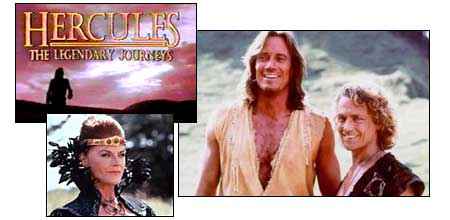Hercules: The Legendary Journeys

Synopsis of TV Show
Mythology seems like an unlikely choice of material for a successful modern television show, but never underestimate the power of the man they call Hercules. Hercules: The Legendary Journeys managed to beat the odds with a combination of old-fashioned pulp thrills and sly modern humor, making it one of the biggest syndication success stories of the 90’s. The show began as a series of made-for-television films produced by Universal and aired in syndication during 1994, and when these did well, Universal commissioned filmmaker Sam Raimi (director of the Evil Dead series) to create a one-hour series based on the Hercules character.
Hercules was a half-man, half-god who was the result of a secret union between the god Zeus and Alcemne, a mortal woman. Zeus did this behind the back of his wife, Hera, who never forgave him for his indiscretion. Zeus watched Hercules from afar, protecting the boy from other gods while he was raised as a mortal by Alcemne. Hercules had the gift of superhuman strength as a result of his heritage and grew up to become a righteous warrior, often fighting alongside his childhood friend Iolaus.
However, Hercules eventually grew tired of fighting and settled down with a wife to raise a family. Just when he thought he had found happiness, the vengeful Hera murdered his wife and children. Hercules became vengeful and set out to destroy Hera’s seven temples. However, his natural compassion overtook his anger when he met people in need along the way. He decided to devote himself to helping mortals fight against evil as he journeyed around the world with Iolaus.
Hercules: The Legendary Journeys chronicled the travels of Hercules and Iolaus as they traveled the ancient globe, using the big guy’s strength to battle gods, evil kings, and monsters as he tried to help the mortals lead better lives. In their travels, Hercules and Iolaus frequently ran into Salmoneus, a traveling salesman, and Autolycus, the king of thieves. Another notable recurring character was Xena, a warrior princess who would later get her own spin-off show. The mythology-derived stories managed to seem fresh because they incorporated modern behavior and language into the stories, even throwing in a little surf culture in at least one episode. This gave the show a modern edge to offset the often-campy nature of the mythology-derived storylines.
The show also spiced up its old-fashioned plots by incorporating science-fiction elements into them. A notable example of this was “The End of the Beginning,” in which Hercules and Autolycus used time-travel. Every now and then, the producers would do a ‘clip show’ by building a loose, usually comedic plot around short segments of past episodes. The most memorable of these clip-show episodes was “Yes, Virginia, There Is a Hercules,” which depicted the show’s staff scrambling to come up with new ideas for the show after an earthquake seemingly caused Kevin Sorbo to disappear. Many of the cast regulars put aside their mythological personas to play show employees in this episode.
The show was quite a success, running for four years in syndication and also spawning two spin-off series in Xena: The Warrior Princess and Young Hercules. It will probably be rerun for many years to come, because its impressive blend of classic adventure motifs with a modern sensibility have an almost god-like power to entertain.
Release History of Prime Time Show
5/5/94 - 11/27/99 SyndicatedTV Sub Categories
sci-fi/fantasyaction/adventure
Television Network
SyndicationTelevision Studio
Universal TVTV Cast
Hercules Kevin SorboIolaus Michael Hurst
Ares Kevin Smith
Morrigan (1998-99) Tamara Gorski
Salmoneus Robert Trebor
Autolycus Bruce Campbell
Hera Meg Foster
Zeus Anthony Quinn
Xena Lucy Lawless
